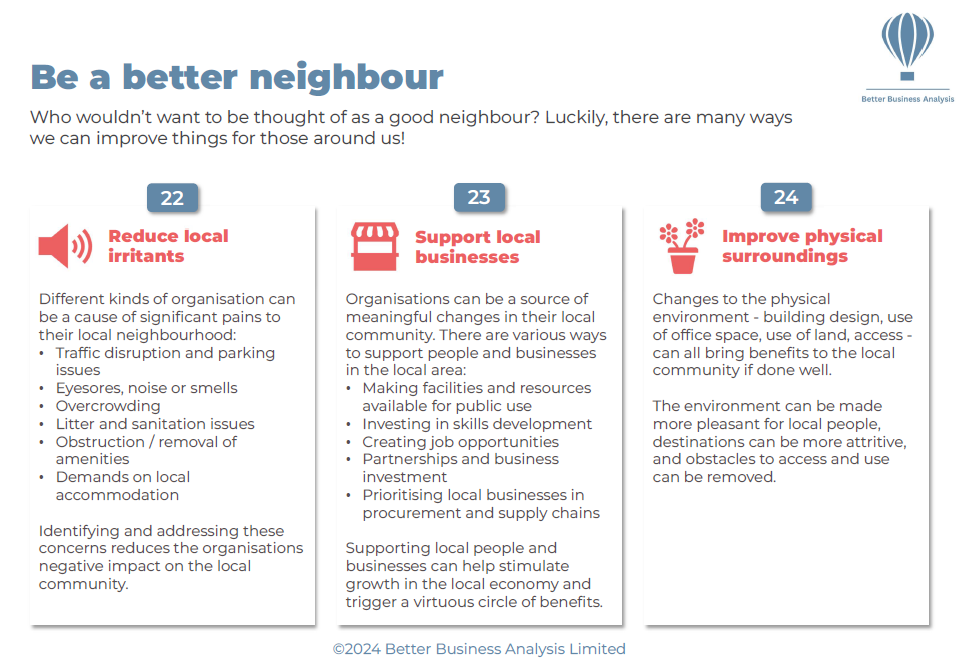Better Business Analysis had its 4th birthday yesterday, and (as well as adopting a new colour scheme) I’ve been doing some belated spring-cleaning on this site. As part of that, I’ve updated the page that talks about my values, and I’ve also added a new item to my Resources page. It’s a guide called ‘Better benefits: 42 wins that go beyond profitability’. You can download it directly here.
I wanted to share the thinking that led me to create it, and explain what it means for my work.

Everyone wants to feel they’re doing good
Many organisations will have some very lofty and noble ideals plastered across their websites and intranets. Even when shareholder returns are the prime driver for the business, values statements suggest a desire to be a force for good in the world (or at least to minimise harms).
Turning proclamations of intent into tangible goods and benefit for the world is another matter. Often, decision-making focuses on short-term cost-savings, profitability, return-on-investment, and the bottom line. Business case templates, KPIs, and incentives all point us towards those things. And (particularly in a for-profit company) those motives are likely to be fundamental imperatives anyway.
I’ve yet to meet any change professional that doesn’t want to feel that their work has value, but it’s easy to overlook the wider goods our efforts already bring about that go beyond the money. We’re already delivering projects or building products that are beneficial to people and the wider world in addition to any cost savings or revenue they seek to generate. But we must recognise this, and shout about it!
We could be doing more
When investment appraisals only focus on the numbers, it’s easy to miss opportunities to that go beyond profitability and create broader benefits in the world. Identifying potential goods and baking these into proposals requires a shift in mindset and a more active (or activist?!) approach.
I’m not suggesting business analysts or project sponsors should go rogue. This isn’t about subverting a company’s strategic goals or values; it is about harnessing existing desires to do good and enabling organisations to live the values and behaviours they aspire to. We can help businesses do better by their customers, their people, and the world at large – and unlock the potential for others to do more good in the future. And we can be explicit about the benefits we seek to achieve.

Guide to ‘better benefits’
In my new guide, I’ve identified 42 types of “win” that go beyond profitability. These are grouped into the following categories:
- Make life better for customers
- Make life better for your people
- Safeguard the business of tomorrow
- Be a better neighbour
- Make the world a fairer place
- Reduce environmental harms
- Unlock future goods
These “wins” can help BAs and other change professionals identify the wider benefits created through the projects and products we’re already working on, and help generate ideas for shaping better projects and products in the future. I’ve included many prompts on how to bake these into our thinking about the scoping and delivery of change initiatives.
What does all this mean for my own work?
I was at a business analysis community event at the tail-end of last year where I found myself discussing whether it would be career-suicide announcing I was only going to take on future work where the primary goal isn’t profitability. I’m sure I’m not in business analysis just to get business owners rich.

Most of my work is with law firms, and with all due deference and respect to the many lawyers I know, they could hardly be described as impoverished! What I do see (in abundance) within law firms is a desire to do good in the world. There are countless ESG and CSR initiatives and action groups. Not only are lawyers devoting time and energy to these things as individuals, law firms are themselves committed to supporting and investing in these. So there’s clearly an appetite there to bring about better things.
I’m not ruling out helping businesses pursue efficiency and profitability as benefits of change initiatives. Reducing waste, streamlining activities, and removing blockages can all result in more than just savings: headaches for staff, delays for customers, wasted materials, and risks to business viability are all addressed through this kind of work.
What I will be doing is putting other kinds of benefit in the foreground and not the background when I talk to prospective clients and in how I scope and deliver business analysis services and engagements. I want to work with clients that want more just a financial ROI.
